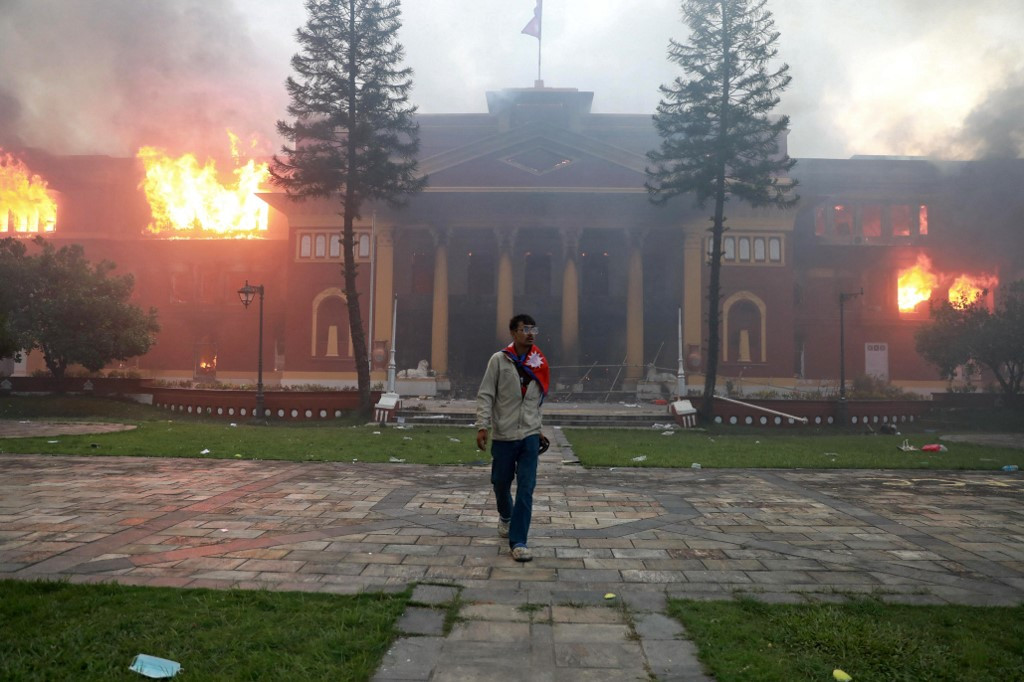Popular Reads
Top Results
Can't find what you're looking for?
View all search resultsPopular Reads
Top Results
Can't find what you're looking for?
View all search resultsNepal in crisis: From protest to political reckoning
Young people must be given a chance to help rebuild democratic systems, their demands must be addressed.
Change text size
Gift Premium Articles
to Anyone
L
ast Tuesday, Kathmandu was a different city, tense and bloody. The air was gray and smoky from the flames and ashes of buildings set on fire by protesters outraged at the government’s violence against peaceful young people demonstrating against a social media ban.
That evening, my wife and I received an unusual invitation from our landlord, who asked us to join him on the top floor of our building. From the terrace, we had an expansive view of a city in deep crisis. It was a night that will be remembered for decades, though it is not clear whether it will be seen as the herald of a new republic or the start of another period of decline.
Caution is needed in such circumstances. The events of last week may not yet mark a new political era. Violence has disappeared from the streets, but the storm has not fully passed. The days and months ahead will be difficult for Nepal.
A new government has been formed under Sushila Karki, the former chief justice of the Supreme Court and the first woman to hold that position. But the political parties discredited by the protests and excluded from negotiations are already regrouping. They are angered that new elections have been called for March while Parliament has been dissolved.
Analysts have noted similarities to protests elsewhere in Asia. Indonesia recently experienced some of the worst violence in its modern history, and Bangladesh is still recovering from a revolution that erupted just over a year ago. In each case, young people took the lead, and although their intentions were peaceful, the protests soon turned violent. Each episode had unique circumstances, and it is too simple to generalize how unrest escalates.
Discontent and polarization are not limited to Asia. Europe and the United States are increasingly divided. In London, more than 100,000 people protested against immigrants. In the US, an extremist provocateur murdered at a university was lionized by the media as if freedom of speech were the only right that mattered.
Violence can never be justified, even when born of frustration with a corrupt elite. It must be condemned without exception. Nor should those who inflame and radicalize discourse be made into heroes.
A recent editorial in The Guardian described Britain’s political climate: “This is the climate in which British politics now finds itself. One in which liberal democracies are not being overturned, but eroded, hollowed out from within by voter disillusionment.” The editorial added: “Democracy does not fail in a single moment. It corrodes. But democratic collapse happens like bankruptcy: gradually, then suddenly.” These words apply broadly to democratic systems in both the Global South and the Global North, which are showing signs of strain.
The problem lies with the pillars of liberal democracy. Political parties, created in the 19th century and consolidated into hegemonic institutions in the 20th, may now have passed their expiration date. Their usefulness and role must be reconsidered. Rethinking political parties requires re-examining the social contract on which liberal democracy rests.
Demis Hassabis, the 2024 Nobel laureate and AI scientist at Google, said that in the era of generative AI, a technology that disrupts traditional education, “learn how to learn” will be essential for future generations. The same logic should apply to how democracies evolve.
In countries with stagnating economies and widening inequality, delegating power to elected representatives is no longer enough. Citizens need new avenues for agency and empowerment to challenge a system in which professional politicians have become a caste.
Young people should not only tear down dysfunctional systems, they must also help rebuild them. Their demands must be met by giving them leadership opportunities. With that leadership must come responsibility and commitment.
Two complementary paths are needed. The first is personal, the second collective. Both require authentic, values-based leadership.
On the personal level, civic education must be rethought, not through nationalism, but with a focus on the common good. Citizens must relearn how to listen to each other and reconsider their use of social media, which often promotes sensationalism at the expense of healthy discourse. Young people must channel their frustration and creativity constructively, including by treating media as a universal public good. Leadership begins with discernment, nourished by reasoned debate.
On the societal level, new forms of citizen-centered policymaking are needed to complement, and perhaps one day replace, elected representatives. Deliberative democracy is essential. Young people should be empowered to lead on both fronts.
The flames of destruction that filled the skies of Kathmandu can be replaced by a different flame, one of hope, if we have the courage to challenge the status quo and redesign how democracy works, from Kathmandu to Jakarta and beyond.
***
The author is a freelance writer who focuses on human rights, democracy, and regional integration in the Asia-Pacific.











